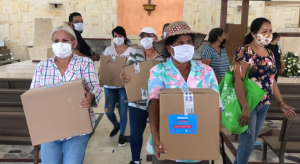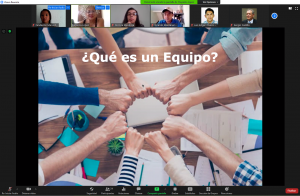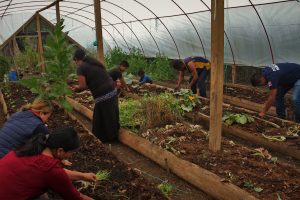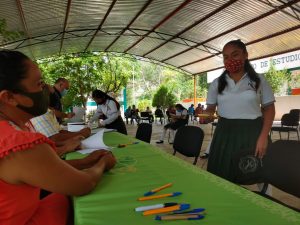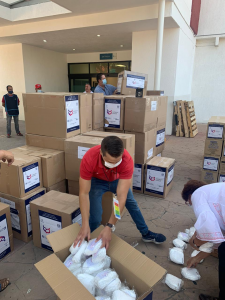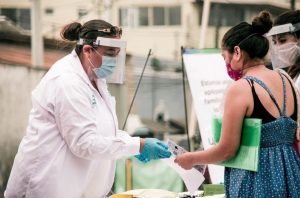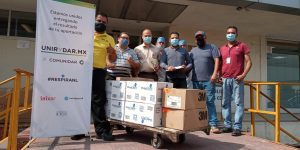Ten ways that Mexican civil society is responding to Covid-19
06 Jul 2020
Comunalia, the alliance of community foundations in Mexico, has launched a new blog (in both Spanish and English) to share the stories of its members, based in 15 states across the country. Mexican community foundations have sprung into action in the face of Covid-19, creatively responding to the health, economic and social effects of the pandemic, with a view to supporting Mexico’s most vulnerable populations. In one of the first posts on its new blog, Comunalia has compiled a list of ways that Mexican community foundations, and local civil society more broadly, is responding to Covid-19, even despite a dramatic drop in income.
1) Collaborating in a spirit of mutual aid
Fundación Comunidad, in cooperation with the Food Bank of Morelos and other civil organizations in the state, launched the Banco de Voluntades (Good-Will Bank) initiative, in order to raise funds to purchase and distribute food and personal protective equipment (PPE) to the populations and families that have been most affected by the crisis. In addition, Fundación Comunidad promotes local food consumption and women producers in the state of Morelos.
2) Meeting immediate and longer-term needs
In the face of the Covid-19 crisis, millions of vulnerable Mexican families have required humanitarian aid. While it has been essential to attend to basic needs, in this period of isolation it has also been important to focus on the emotional and developmental needs of young children in the medium and long-terms. With this in mind, the Pact for Early Childhood initiative launched Los Kits Juega (Play Kits), a recreational tool to mitigate stress and provide emotional support through play. At least 50,000 families have already received their kits.
3) Digitally transitioning their value offer
To overcome the challenge of physical distancing, the Fundación Merced Querétaro has found various ways to move their activities online during the pandemic. The foundation is offering digital strengthening services to citizen organizations and initiatives, and is organizing various online trainings and virtual conversations to ensure that local civil society continues to organize and act collaboratively.
4) Showing empathy for the team
Comunalia joined the collaborative initiative #LoHacemosPorMéxico (#WeDoItForMexico). Working closely with a number of other actors, the initiative seeks to address the mental health and well-being of community foundations’ staff and their collaborators across Mexico, who have been providing urgent support in the face of the crisis. Between the emotional overload of this work, long and stressful working hours and contact with vulnerable groups, in addition to the stresses felt by many in their private lives during the pandemic, the overall well-being of frontline workers must be taken into account. For this reason, this initiative seeks to create empathy as its first objective, and connect team members to mental health professionals for any support that they might require.
5) Finding new ways to operate
In order to make the organizations that it supports and strengthens more visible, Amigos de San Cristóbal in Chiapas created a series of webinars that showcase the work and impact of its Organizaciones Amigas (Allied and Supported Organizations). Their intention is to encourage more individuals to engage with citizen causes and grassroots initiatives in the context of the health and economic crisis. Each week they present a different organization in a lively Zoom session.
6) Being flexible
Covid-19 has impacted the development and continuity of many programmes and initiatives from civil society actors. Recognizing the need in its community, the Fundación Comunitaria Oaxaca not only continued with its Community Scholarship Programme, but built in more flexibility to ensure as many students as possible would continue to benefit from it. This involved developing new methods for ensuring the cash support ended up in the hands of students – as many of the students were based in rural communities without access to online banking, the foundation worked with a network of local actors who handled the deliveries. The foundation also relaxed some of the programme’s requirements for the students who, for example, were no longer required to update their information on the programme’s digital platform (which was not feasible for those without internet connectivity) nor submit final report cards (as many school authorities are lagging behind in paperwork). During the 2019/2020 school year, the programme allowed more than 155 high school students in six regions of Oaxaca to successfully continue with their studies.
7) Creating a crisis management team
In Chihuahua, local businesses, social initiatives and local authorities came together under the leadership of the Fundación del Empresariado Chihuahuense, and formed a crisis team to respond to Covid-19. By the end of May, the team had disbursed 37 million MXN (over $1.6 million USD), and had purchased critical medical supplies and equipment for hospitals, clinics and health centres in different municipalities in the state, and had also provided needed food and other supports for families living in vulnerable conditions.
8) Advocating on behalf of the sector
In Jalisco, Corporativa de Fundaciones and other civil society organizations have come together to push the state government to include organized civil society (along with micro and small businesses) in any plans for the economic reactivation of the area – including access to any potential relief funding. They are aiming to prevent the disappearance of the thousands of civil society organizations across the state that have been negatively impacted by the crisis.
9) Listening and being empathetic
Despite overcoming the critical, initial response stage of the pandemic, the general feeling is that the most difficult stages are still to come. For this, the initiative #NecesitamosEscucharnos (#WeNeedToListenToEachOther) was launched at the end of April. It brings together 65 civil society organizations, collectives, activists and journalists, who have all committed to creating spaces and channels to discuss the growing inequality in Mexico, which has been further highlighted by Covid-19. The campaign invites regular citizens, particularly those most affected by the crisis, to share messages and stories about their realities, their needs and their ideas for overcoming the crisis, over social media.
10) Generating a solidarity movement
In Nuevo León, Fundación Comunidar has pulled together solidarity efforts from community members, local businesses and the local government through the movement Unir y Dar (Unite and Give). Movement partners developed a three-phase plan that will provide urgent support to the medical system, critical support to individuals who have lost employment and, in the long-term, will promote economic recovery of the region. The first phase, #RespiraNL (#BreatheNL), involved the work of more than 100 volunteers, who sourced and delivered essential medical equipment to hospitals. The second phase, #AbrazaNL (#EmbraceNL), saw the movement providing support to vulnerable individuals who lost employment, and who earned less than 10,000 MXN (approximately $430 USD) per month. The third stage, #ReactivaNL (#ReactivateNL) will see the movement contribute to the recovery of lost, or at-risk, sources of employment, and to the overall reactivation of the local economy.
For more information on any of these initiatives, please contact contacto@comunalia.org.mx.


